Meet the speakers for the Symposium on May 12th and 13th!
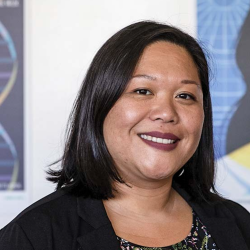
Audrey Parangan-Smith
Audrey Parangan-Smith, PhD is the Director of the SF BUILD Program and Adjunct Assistant Professor of Biology at San Francisco State University. She is a first-generation college graduate and a “Double Gator,” having pursued her undergraduate and master’s degree at San Francisco State University. With a PhD in Microbiology from UC Berkeley, she returned to SF State as a postdoctoral fellow in Science Education wanting to do more to change the dominate culture and narrative in science. Joining SF BUILD as one of its inaugural members, she now plays a role in SF BUILD leadership, focusing on culturally affirming student research and faculty pedagogy training to enhance STEM student belonging and persistence.
Alexandra Velasquez
Alexandra graduated from UC Davis with a BS in Psychology with a Biology emphasis and a minor in Social and Ethnic Relations. She holds an MS in Healthcare Administration and Interprofessional Leadership from UCSF and is a certified clinical researcher from SoCRA. Her research interests include healthcare disparities, language barriers, educating and empowering underserved populations, training research personnel, developing innovative solutions, and process improvements. Currently, she is a Clinical Research Coordinator Supervisor in kidney health and serves as a navigator for the Clinical and Translational Science Institute (CTSI), supporting researchers in increasing community engagement and integrating special populations. Alexandra leads, develops, instructs, and coordinates the CIRCLE program, aiming to diversify the clinical research workforce and advance inclusive research and health equity. She is also part of the AVCR-IDEA office focusing on workforce development efforts.
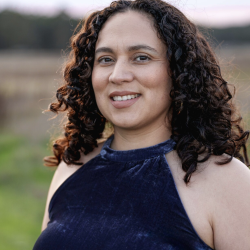
Carol Umanzor
Carol Umanzor is the Agents of Change Specialist (AoC) for SF BUILD at San Francisco State University and is currently a PhD student at the University of Michigan working towards a degree with a focus on science education research. During her time at SFSU supported in managing and developing the AoC Peer Mentoring Program, AoC Fellows and AoC Scholarship programs. Along with that she was the co-Investigator on an NSF funded science education research project investigating the experiences of undergraduate women of color in biology.
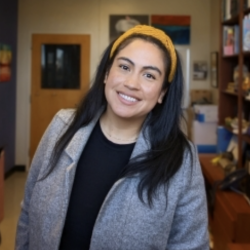
Cathy Samayoa
Dr. Samayoa is an Assistant Professor in Biology at San Francisco State University. She earned her PhD in Cancer Biology from the University of Texas Health San Antonio and her MS and BS in Cell and Molecular Biology from SF State. Dr. Samayoa participated in NIH-funded training programs that fostered her commitment to inclusive research and mentorship. As co-director of the Health and Equity Research Lab at SF State, she leads studies on cancer health inequities affecting women of color, focusing on overcoming barriers to biospecimen collection among rural, Spanish-speaking Latina breast cancer survivors. Her research integrates community-engaged approaches, molecular biology tools, and large-scale data analysis to explore the impact of stress on cancer disparities. Dr. Samayoa aims to advance health equity and support the next generation of scientists in addressing cancer disparities.
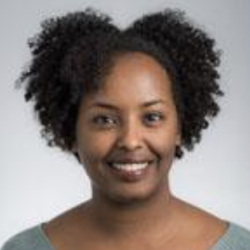
Ekland Abdiwahab
Ekland Abdiwahab PhD, MPH is a Social Epidemiologist who studies cancer outcomes in Black U.S. populations. Her research explores how multilevel social stressors including racial trauma, adverse early life experiences, and neighborhood conditions impact cancer-related health behaviors and cancer incidence. Ekland has collaborated with SF BUILD since 2016. As someone historically underrepresented in higher education, she uses her experiences to inform her own mentoring style and mentorship relationships with BIPOC scholars, faculty, and administrators.
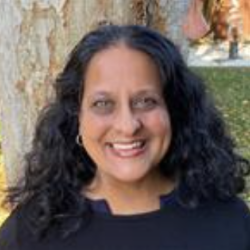
Kala Mehta
Kala M. Mehta, DSc, MPH is a Professor in the Department of Epidemiology and Biostatistics at the University of California, San Francisco. Kala has three main arms to her work. As a scientist, she focuses on community-centered action research in both US domestic and global contexts. Her work spans the life course with 10 publications focusing on newborn and maternal mortality and over 20 publications on mortality disparities in older adulthood. She often uses principles of intersectionality and social entrepreneurship to make sure populations are included and the work is sustainable beyond research. She is an inaugural leader in the “Justice and Advocacy in Medicine” curriculum for first year leaners where medical students learn to advocate for the patient in front of them, no matter who they are, and learn to tackle upstream social determinants of health to impact population health. She has led or co-led four pathway learning programs to change the face of scientists and health professionals at UCSF. In the context of today’s workshop, Kala was a co-leader of the student training core of SF BUILD.
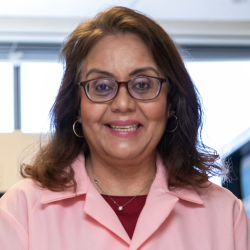
Leticia Márquez-Magaña
Leticia Márquez-Magaña is a native-born U.S. citizen. She started school speaking only Spanish as the eldest daughter of Mexican immigrants. Unlike her parents, she had the opportunity to complete high school and was first-generation to college. At Stanford University she earned biological sciences degrees before becoming the first, and only, Latina to earn a biochemistry PhD at UC Berkeley. Following post-doctoral training at Stanford, she was an Affirmative Action hire in biology at San Francisco State University. In this 30-year role, she focuses on “giving back” to minoritized communities who co-created her radical path to becoming an impactful biomedical researcher.
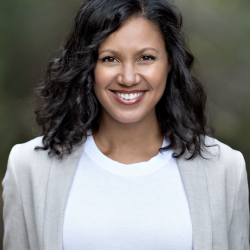
Marilyn Thomas
Dr. Thomas is an Assistant Professor in Residence at UCSF, with appointments in the Division of General Internal Medicine and the Department of Epidemiology and Biostatistics. She is also core faculty at the Philip R. Lee Institute for Health Policy Studies and Co-Director of the SF BUILD program. A social epidemiologist, Dr. Thomas investigates how structural racism contributes to Black–White and other racial health inequities. Her research explores anti-Black policing, race-based discrimination, and racialized experiences in higher education, emphasizing causal inference and policy effects. In 2022, she received a K99/R00 Award from the National Institute on Aging to study the impact of Historically Black Colleges and Universities on late-life cognition in Black adults.
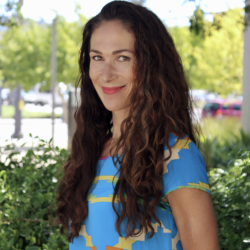
Meghan Morris
Meghan Morris, PhD, is the UCSF Director of SF BUILD and a professor and vice chair in the Department of Epidemiology and Biostatistics at UCSF. Her research focuses on public health, substance use, and homelessness, addressing systemic health disparities. She broadens the reach of research through peer-reviewed articles, op-eds, and community newsletters. As a Public Voices Fellow, she amplifies underrepresented voices in public discourse. Meghan advocates for policies that meet the needs of vulnerable communities and emphasizes the importance of engaging a broader audience to drive systemic change. Meghan will discuss the opportunities for expanded reach through writing to change public discussion and policies, highlighting the importance of engaging with a broader audience to drive systemic change.
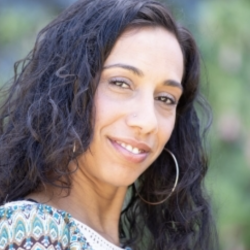
Rama Ali Kased
Dr. Rama Ali Kased is an Associate Professor in Race and Resistance Studies at San Francisco State University. She holds degrees in Philosophy, Political Science, Social Justice, and Educational Leadership. With extensive experience in curriculum development for K-12 and higher education, Dr. Kased is a seasoned community organizer originally from Brooklyn, New York, of Palestinian heritage. She founded Arab Women Active in Arts and Media (AWAAM) and the Arab Resource and Organizing Center (AROC). Her community work includes leadership training and campaign support for public office candidates. At SF State, Dr. Kased has led initiatives like AB 540 and the men of color academic success work group. Her teaching focuses on education equity, racial and economic justice, and community engagement. She co-founded the Metro College Success Program, serving underrepresented students. Her research examines social justice education, aiming to transform classrooms into spaces of liberation and social change.